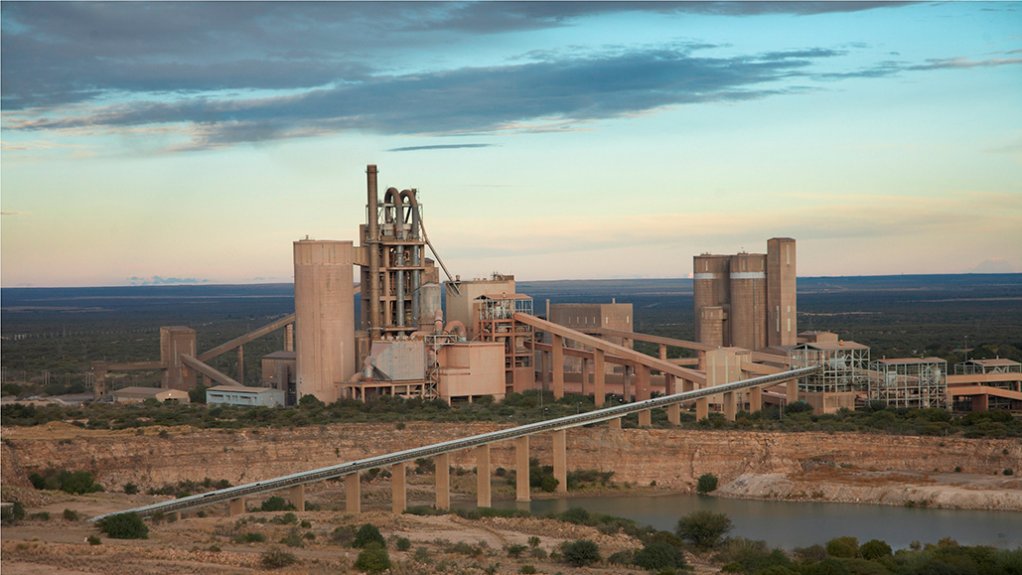Cement extenders help cut carbon emissions
Substituting clinker in cement with a portion of cementitious materials that are by-products of other industrial processes, has led to substantial gains in decarbonisation, says construction materials supplier AfriSam.
According to AfriSam process engineer Marieta Buckle, the company has reduced its carbon dioxide (CO2) emissions per ton of cement by 33% since 1990, and says that the use of extenders – mainly fly ash and granulated blast furnace slag, is an important factor in its reduced emissions.
She adds that AfriSam has put a ‘carbon footprint’ on all of its production operations, including cement, aggregate and readymix concrete. Its CO2 rating system indicates each product’s carbon footprint relative to Ordinary Portland Cement, or OPC.
Buckle explains that producing clinker is the most energy intensive aspect of cement manufacturing, making it a prime driver of CO2 emissions. AfriSam says it has promoted decarbonisation by reducing the portion of clinker in cement while maintaining its strength and other properties. In addition, the company notes that the use of extenders also enables formulation of cement products that have improved characteristics specific to the application.
“AfriSam’s extensive research and development effort has been able to develop a cement mix that comprises up to 70% of alternative materials,” says Buckle. “Such a mix would contain only 30% of clinker while still providing the required cementitious properties for the application. Importantly, it consumes less energy – and generates fewer carbon emissions – in the production process.”
AfriSam highlights carbon emissions per tonne of cement produced is considerably lower than the average among South African cement producers and lower than the global average of carbon emissions per tonne of cement.
“By using what are essentially waste materials like fly ash and slag, we can leverage the energy that has already been consumed in generating them as by-products,” says Buckle. “Apart from the value of recycling a waste product, we can make our cement production gradually more sustainable by reducing the energy that is required.”
Article Enquiry
Email Article
Save Article
Feedback
To advertise email advertising@creamermedia.co.za or click here
Press Office
Announcements
What's On
Subscribe to improve your user experience...
Option 1 (equivalent of R125 a month):
Receive a weekly copy of Creamer Media's Engineering News & Mining Weekly magazine
(print copy for those in South Africa and e-magazine for those outside of South Africa)
Receive daily email newsletters
Access to full search results
Access archive of magazine back copies
Access to Projects in Progress
Access to ONE Research Report of your choice in PDF format
Option 2 (equivalent of R375 a month):
All benefits from Option 1
PLUS
Access to Creamer Media's Research Channel Africa for ALL Research Reports, in PDF format, on various industrial and mining sectors
including Electricity; Water; Energy Transition; Hydrogen; Roads, Rail and Ports; Coal; Gold; Platinum; Battery Metals; etc.
Already a subscriber?
Forgotten your password?
Receive weekly copy of Creamer Media's Engineering News & Mining Weekly magazine (print copy for those in South Africa and e-magazine for those outside of South Africa)
➕
Recieve daily email newsletters
➕
Access to full search results
➕
Access archive of magazine back copies
➕
Access to Projects in Progress
➕
Access to ONE Research Report of your choice in PDF format
RESEARCH CHANNEL AFRICA
R4500 (equivalent of R375 a month)
SUBSCRIBEAll benefits from Option 1
➕
Access to Creamer Media's Research Channel Africa for ALL Research Reports on various industrial and mining sectors, in PDF format, including on:
Electricity
➕
Water
➕
Energy Transition
➕
Hydrogen
➕
Roads, Rail and Ports
➕
Coal
➕
Gold
➕
Platinum
➕
Battery Metals
➕
etc.
Receive all benefits from Option 1 or Option 2 delivered to numerous people at your company
➕
Multiple User names and Passwords for simultaneous log-ins
➕
Intranet integration access to all in your organisation





















